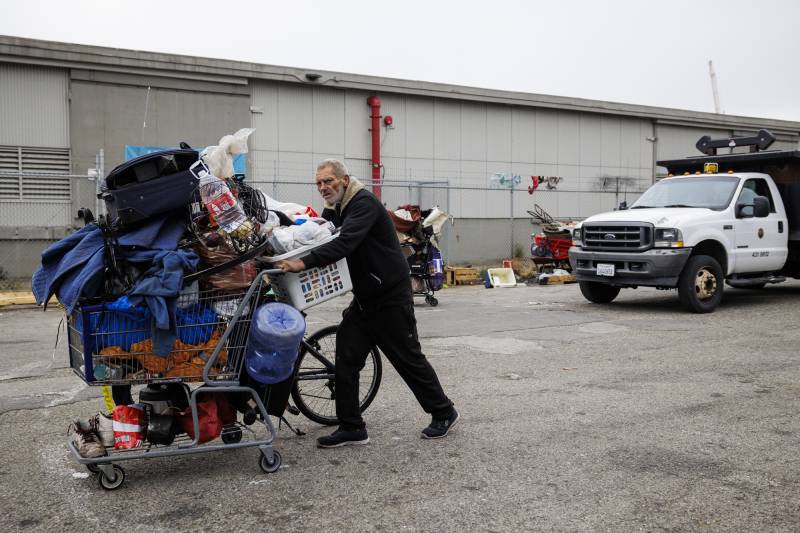Newsom singled out the city of Huntington Beach for its ongoing efforts to stymie new housing production, saying he’d use a newly signed law, SB 1037, to enforce steep fines of up to $50,000 a month against it.
“For those who turn their backs on this crisis, we’re turning up the heat,” Newsom said.
The bill gives the attorney general more power to seek penalties against local governments that refuse to adopt a compliant housing element or break housing law, money that would go toward developing affordable housing within the community where the violation occurred.
It’s one of two bills Attorney General Rob Bonta sponsored. Together, the legislation provides greater incentives, encouragement and clarity to help locals meet their housing obligations, he said.
“We believe that all of our incredible, good faith-acting cities … will help us get to where we need to go when it comes to creating what we all know we need — an affordable California,” he said.
Oakland Assemblymember Buffy Wicks authored a bill that updates the state’s “builder’s remedy” provision, in place since 1990, that gets triggered when a local government fails to pass a housing plan that meets state requirements and limits local government’s ability to reject certain affordable housing projects.
Wicks’ legislation, AB 1893, makes more projects eligible for that streamlined approval and gives city planners clarity about the application requirements.
“Inertia and the status quo are no longer acceptable in California,” Wicks said.
Newsom said over 70 housing-related bills made it to his desk this year. He signed 32 today. Here are some of them:
Preventing and ending homelessness
- AB 799 by Assemblymember Luz Rivas: Aims to enhance the coordination and transparency of efforts to address homelessness in California.
- SB 1395 by Sen. Josh Becker: Encourages the construction of tiny homes and other interim housing by streamlining zoning and CEQA requirements.
Accountability
- AB 1893 by Assemblymember Wicks: Updates the original Builder’s Remedy law to reduce the amount of affordable housing required, among other changes.
- SB 1037 by Sen. Scott Wiener: Gives the attorney general more power to seek penalties of up to $50,000 per violation, per month, against local governments that refuse to adopt a compliant housing element or break housing laws. Money collected through the fines would go toward developing affordable housing within the community that violated the law.
- SB 450 by Sen. Toni Atkins: Updates SB 9, which allows property owners to subdivide parcels zoned for single-family homes in most urban neighborhoods and build up to two duplexes.
Housing streamlining and production
- AB 2243 by Assemblymember Wicks: Simplifies and adjusts the approval process for affordable and mixed-income housing developments in California.
- AB 2488 by Assemblymember Phil Ting: Allows for the conversion of commercial buildings into residential units through a special financing district in downtown San Francisco.
- SB 312 by Sen. Wiener: This is clean-up legislation from an earlier law, SB 886. The original law, which went into effect in 2023, streamlined the construction of student and faculty housing.
- SB 1123 by Sen. Anna Caballero: Eases land subdivision regulations for small housing projects to boost affordable housing.
- SB 1211 by Sen. Nancy Skinner: Increases the number of detached granny flats allowed on multifamily properties so they can be approved more quickly and avoid long permitting times.
Transparency and efficiency
- AB 2553 by Assemblymember Laura Friedman: Limits local impact fees by extending the definition of what constitutes housing near transit, allowing more housing developments to pay lower local vehicular traffic impact fees, reflecting lower rates of car trips from those buildings.
- AB 2663 by Assemblymember Timothy S. Grayson: Requires local governments to annually post online the amount of inclusionary housing fees collected in the previous year and whether those fees are intended to be used for a project, if any.
- SB 937 by Sen. Wiener: This bill would allow developers to pay hefty development fees, imposed by cities, after people have moved into the new housing. Right now, those fees are often due at the start of or during construction — before developers have had a chance to collect rents.
Housing protections
- AB 2801 by Assemblymember Friedman: Prevents landlords from keeping a tenant’s security deposit to pay for cleaning, as long as the tenant leaves the home as clean as they found it. — Tenancy: security deposits
- AB 2747 by Assemblymember Matt Haney: Requires landlords to give tenants the option to opt into reporting their positive rent payments to a credit bureau agency, which could help boost their credit score. The law only applies to buildings with more than 15 units and allows landlords to collect a fee to cover the cost of reporting tenants’ rent payments.

